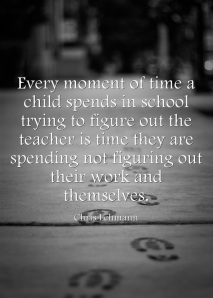Giving children opportunities to question, to be creative, and to problem solve are high on my priorities. Children need to be given the time and opportunity to figure out things for themselves. While it is sometimes easier just to tell or show them what to do, or even do it for them, it is generally better for their development, to let them have a go at finding a method or solution. Please note: I am not talking about dangerous things here like playing with fire, testing to see how fierce that dog really is, or driving a car.
If children are constantly told there is a right way of doing things, they will stop exploring, discovering, and inventing their own or new ways of doing things. This is an issue because, if we always do what we’ve always done, we’ll never progress. There is generally no harm in, but much to learn from, each successive attempt.

Opportunities to explore, discover, and use intuition are also important to the development of mathematical thinking. When children are developing understanding of number, they often invent their own strategies for working with numbers. Sometimes, as attested in this paper by Heirdsfield, Cooper and Irons, the strategies used display more advanced thinking, and are more efficient, than those taught as ‘the’ correct way of solving a problem using pencil and paper.
I have noticed a change in the speed and agility with which my seven-year-old grandson works with numbers now that he has learned there are certain ways of; for example, adding two numbers. He tends to second-guess himself as he attempts to mentally calculate using the pencil and paper method he has been taught, rather than other more effective strategies he had previously invented and used. Perhaps you have noticed something similar.
Provocations, such as these 3 Fun Inquiry Maths Activities for the Last Week of School by Steph Groshell on Education Rickshaw, are great to get children thinking about different ways of solving real problems.

Little Koala’s Party – a story for problem solving in the readilearn mathematics resources also encourages mathematical thinking and planning. Children help Little Koala organise a party for her family and friends, deciding who will be invited, the number of guests, and what’s on the menu. The suggestion is made that children plan a party of their own and they are asked to consider how they would go about it. The discussion and sharing of ideas, rather than the imposition of one ‘right’ way, is the important thing in developing mathematical thinking.
Now it might seem a stretch to tie this in with a piece of flash fiction, but I hope you’ll be able to follow my thinking through the mist and into the light.
This week at the Carrot Ranch, D. Avery took the reins from Charli Mills and challenged writers to in In 99 words (no more, no less) write a story that symbolically, mythically, mystically, or realistically involves dawn, as a noun or verb. Write about the dawn of time or the time of dawn, or the dawning of an idea. As always, go where the prompt leads.
The right way
Father and Son sat side by side. Father cracked his knuckles and sighed repeatedly while Son sharpened his pencils, each pencil, and arranged them meticulously according to undisclosed criteria.
“Come on. Just get it done. Then you can play.”
“I’m thinking.”
“Think faster.”
“I know it’s 96.”
“Well write it down.”
“Sir says I have to do the working out.”
“Then do it.”
“I don’t know how.”
“Like this. See.”
“That’s not how we do it. Sir says…”
“Then do what Sir says.”
Slowly it dawned on Dad: Sir’s way may not be the best way for all.

Thank you for reading. I appreciate your feedback. Please share your thoughts.












